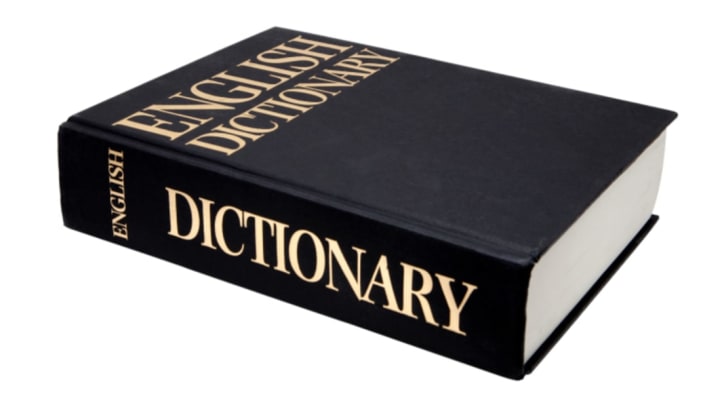It can be hard to realize, nowadays, that there is a life beyond Noah Webster's dictionary of the English language (if you're American) and the Oxford English Dictionary (if you're British). But natural selection and evolution in the several centuries that English dictionaries have been extant have resulted in a narrowing of the field of word collections down to the major two, accepted as the basis of language for pretty much the entire English-speaking population of the world.
Of course, just because some dictionaries have fallen by the wayside in the years since the world's first dictionary doesn't mean that they weren't any good. Here are six forgotten dictionaries that ought to be lining your bookshelf (or loaded up in your internet browser).
1. A Dictionary of the Vulgar Tongue (1811)
You know how one of the first things you did as a child when you received your first dictionary was to go to the dirty words and look up their meanings? Captain Francis Grose decided 300 years ago to make that whole process easier for you.
In 1811, Grose published his Dictionary of the Vulgar Tongue, a Dictionary of Buckish Slang, University Wit, and Pickpocket Eloquence. Grose's dictionary captured the language of the streets in 1811 London, which was often rude and coarse. In many ways he prefigured many of the linguistic studies today that seek to capture speech as it is spoken, rather than as it ought to be.
2. Reverse Dictionary
Reverse Dictionaries are a curious breed, more like a thesaurus than anything else. The Reader's Digest edition of the reverse dictionary claims it helps "to find the words on the tip of your tongue," allowing you to look up a word in the same area that you do know, and find a word in a similar sphere of knowledge that might be closer to what you want.
3. A Table Alphebeticall (1604)
Robert Cawdrey wasn't initially credited on the title page of the first run of his dictionary, printed in 1604 and sold by printer Edmund Weaver "at the great North door of Paules Church," but the priest ought to have been less chary about being identified: his contribution to language was enormous.
Cawdrey was one of the first people, if not the very first, to try and define what words meant. Before then there was no real need to codify meaning into words; Cawdrey, in fact, in his definition of define, doesn't even mention that words can be defined—for him it is only "things" that require definition. Yet his work would prefigure some of our most important dictionaries.
4. Walker's Rhyming Dictionary (1775)
Songwriting and poetry can be difficult; just ask William McGonagall, who tried his hand at poetry and ended up producing some of the worst verse known to man. Rhyming poetry is even more difficult. John Walker, a sometimes actor, compiled and published his rhyming dictionary only 20 years after Samuel Johnson created his totemic list of language, but it was quite different.
For one thing, it wasn't in alphabetical order. Well, it was, but not in order of the first letter of the word. Because rhymes fall on the final syllable of a word, Walker arranged his in alphabetical order based on the final letters of the word. Thus "idea" (aedi) follows right after "panacea" (aecanap) in the A section right at the start of the dictionary.
5. The Dictionary of Non-Words (2010)
In 2010, student Luke Ngakane approached the Oxford English Dictionary to ask for access to a secret vault the OED keeps. Inside the vault are more than 50 filing cabinets filled with 6"x4” index cards of words.
Though it may seem surprising to learn that the OED keeps its words on index cards, that’s not the unusual thing (even today, the people behind the dictionary use paper copies for their draft definitions). What Ngakane wanted to see was the contents of the cards—because in the vault are the words that don’t make the dictionary. According to Ngakane, that includes words such as “dringle” (the watermark left on wood caused by a glass of liquid) and “percuperate” (prepare for the possibility of being ill). Ngakane etched the words onto a metal plate and then printed them for his graphic design degree. [Note: Ben Zimmer of Visual Thesaurus poured cold water on the "secret vault" element of this story, which you can read here.]
6. Wye’s Dictionary of Improbable Words (2009)
How many words do you know that are either all consonants or all vowels? Craig Conley trawled the English language and found 4000 examples gathered together in Wye’s Dictionary of Improbable Words. From B-Z (for the consonant-only section, beginning with “b’chtsch”) and A,E,I,O,U and Y (for the vowel-only section, starting with “a i-eee ai-eeee”), there’s proof that sometimes our language doesn’t quite make sense, and that it’s possible to form words without some of our alphabet’s most important letters.
